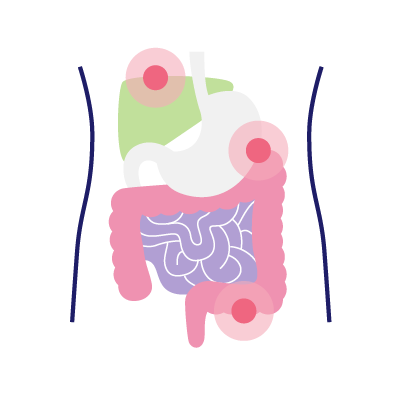
Gastrointestinal Cancers
Colorectal cancer is a type of cancer that develops in the large intestine. The term colon cancer refers to cancer that develops in the colon, the longest part of the large intestine. The term rectal cancer refers to cancer that develops in the rectum, the final straight part of the large intestine that ends in the anus. Colorectal cancer is the most common cancer in Europe and the third most common cancer worldwide. Colorectal cancer is more frequent in men than in women. Most patients with colorectal cancer are more than 60 years old at the time of the diagnosis, and colorectal cancer below the age of 40 years is rare.
Oesophageal cancer is a tumor that forms in tissue lining the oesophagus, the muscular tube through which food passes from the throat to the stomach. The two main types of esophageal cancer are squamous cell carcinoma and adenocarcinoma. Both types occur at about the same frequency.
Pancreatobiliary Cancer: The biliary system consists of the organs and duct system that create, transport, store, and release bile into the duodenum (the first part of the small intestine) for digestion. The pancreas produces two substances: juices that help break down (digest/exocrine) the food, and hormones (such as insulin/endocrine) that regulate how the body stores and uses food. Over 90 percent ofcancers of the pancreas are found in the tissues of the exocrine pancreas. Treatment options are very limited.
Gastric cancer: Also called stomach cancer. Most gastric cancers start from cells in the inner layer of the stomach (the mucosa) which normally make and release mucus and other fluids. These cancers are called adenocarcinomas and represent about 90% of stomach cancers. Worldwide, stomach cancer is most common in East Asia, parts of South America and Eastern Europe. It is less common in Western Europe even though stomach cancer is the fifth most frequent cancer in Europe. It is approximately twice as frequent in men as it is in women. It is most often diagnosed around the age of 60.
Clinical trials
A ‘clinical trial’ is a research study in which people agree to test a potential new treatment to prevent or improve a disease or medical condition. A clinical trial also looks at how participants react to the potential new treatment and if any unwanted effects occur. This helps to determine if the new investigational treatment works, is safe, and is better than those that are already available. Many clinical trials also compare existing treatments or test new ways to use or combine existing treatments.
Clinical trial of Debio 1143 with nivolumab in specific advanced solid tumors
Debiopharm International is conducting an open-label two-part Phase 1b/2 trial in male and female patients with either small cell lung cancer, squamous cell carcinoma of the head and neck, selected gastrointestinal or gynecologic cancers with specific genetic alterations. Tumors with these genetic alterations may respond better to this study treatment. To be eligible, patients must have received at least one prior standard chemotherapy or have no established standard therapeutic alternatives. In addition, patients must have progressed during prior immuno-oncology treatment.
The purpose of Part B is to evaluate whether Debio 1143 combined with nivolumab leads to efficient shrinkage of the tumor in patients with different types of cancer and to determine how safe it is.
Debio 1143 is an investigational medicinal product. Nivolumab is a monoclonal antibody that specifically blocks a target in the body called PD-1 and stimulates the immune system to fight cancer cells.
Debio 1143 is administered orally once daily for 10 consecutive days every 2 weeks. Nivolumab is administered by infusion every 2 weeks.
-
Phases
When a potential new medication is being developed, it is first tested in a laboratory setting. If the results are positive, the drug may enter a clinical trial program. This means that it will be tested in humans in several ‘phases’ of study.
Phase I = Safety evaluation. The very first administration in humans, typically carried out in a small group of healthy volunteers to assess if the drug is safe.
Phase II = Efficacy evaluation. The first trials in patients with the intended disease to check if the drug works efficiently and if there are any unwanted side effects.
Phase III = Confirming findings. Trials in large numbers of patients that generally compare the drug to the best treatments available._Phases
- P
- Ⅰ
- Ⅱ
- Ⅲ
- M
Please share any related associations that may be useful